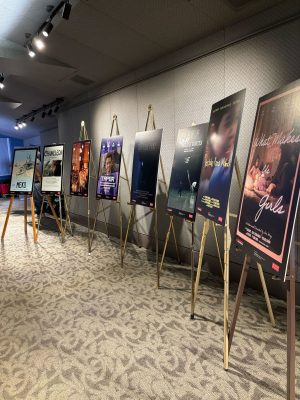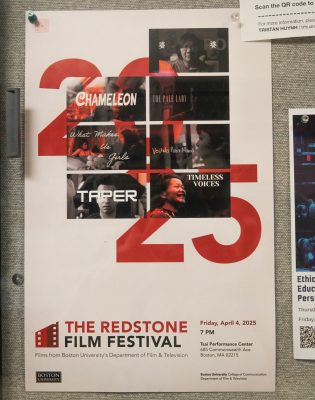Audience members cheered their way through screenings of the films awarded as finalists at the annual Redstone Film Festival Friday. The student films depicted dynamic narratives ranging from identity, end of life, immigration and young adulthood.
The festival, held at the Tsai Performance Center, is hosted every spring by Boston University’s Department of Film & Television.

Sponsored by the Sumner Redstone Foundation, Redstone is known among some Film & TV students as a sought-after honor, especially given the high caliber of the films that become finalists.
“The Redstone Film Festival is really the culmination of students making a series of good decisions that work,” said Craig Shepherd, chair of the Department of Film & TV. “We should praise that, and we should appreciate it, and we should honor the learning and the film and television education that these students are getting.”
Students begin submitting their films for consideration as early as November, and the production faculty review and rate the films to choose the top six or seven nominees, Shepherd said.
The films are then sent to an independent panel of industry professionals who review them and decide on the winners in each category.
After a screening of the seven finalist films, Maura Smith, a College of Communication master lecturer in film, presented the awards to this year’s winners.
“Pópo,” directed and produced by senior JingYi Li, is an intimate documentary that follows a family of Hong Kong immigrants in Boston through their final days with their grandmother, who is in hospice care.
The film focused on familial love and the confrontation of the final days of a loved one.
“Pópo” won the first place Redstone Film award and the best documentary prize, with junior Meng Kai Cheang and junior Sadie Kennedy — both a part of the crew — receiving three additional awards. Cheang earned best cinematography and Kennedy took home best editing and best sound design.
“We worked really hard to make this film. It was very meaningful to all of us,” Kennedy said. “It was a very emotionally involved process because some of us kind of had experiences with death … this experience kind of hit close to home.”
This win came after “Pópo” also won the first place “Mass Reality Check” award at the Salem Film Festival in March. The film was produced in conjunction with the Film & TV course Documentary Production, Kennedy said, and the crew was able to collaborate with faculty members throughout the process.

The second place award went to “What Makes Us Girls,” written and directed by senior Ria May. The film is a coming-of-age narrative about Arlo, a 17-year-old trying to make sense of womanhood while dealing with the struggles that come with the end of girlhood.
“It’s just a story about sisterhood and uplifting the woman in your life,” May said, “which is a message that I’m always going to be passionate about.”
The film was more than a year in the making and was made during FTV course Production 3, one of the highest level production courses BU offers to undergraduates, May said.
May and her crewmates had some 18-hour days during the height of their work and found the Redstone nomination very gratifying.
“As a filmmaker, especially a student filmmaker, we pour our hearts and souls into telling these stories, but it only really matters when you can show it to people and have an audience to watch it and resonate with it,” May said.
The third place prize went to “Taper,” written and directed by graduate student Ben Locke. It is a story about a Black queer student who grapples with his identity in the contexts of a predominantly white institution and the typically hyper-masculine men’s barbershop.
“Taper” also earned the best production design award, and at last year’s Redstone Festival the short script was awarded second place, Locke said.
“It’s a very full circle moment to be like, ‘This was a script that was nominated’ and then for it to come to fruition and win and be nominated was really special,” Locke said.
He said he has seen people of all ages, backgrounds and sexual orientations respond positively to the film, which he sees as a validation of the universality of storytelling.
“It’s always nice to get recognition,” Locke said. “But I think, you know, I had so much fun doing it, and I’m just so proud of the way that it turned out.”
May cited the sense of community the event offers as a significant aspect of the night for her.
“You’re just surrounded by all these people who love film,” she said. “What else can I ask for?”